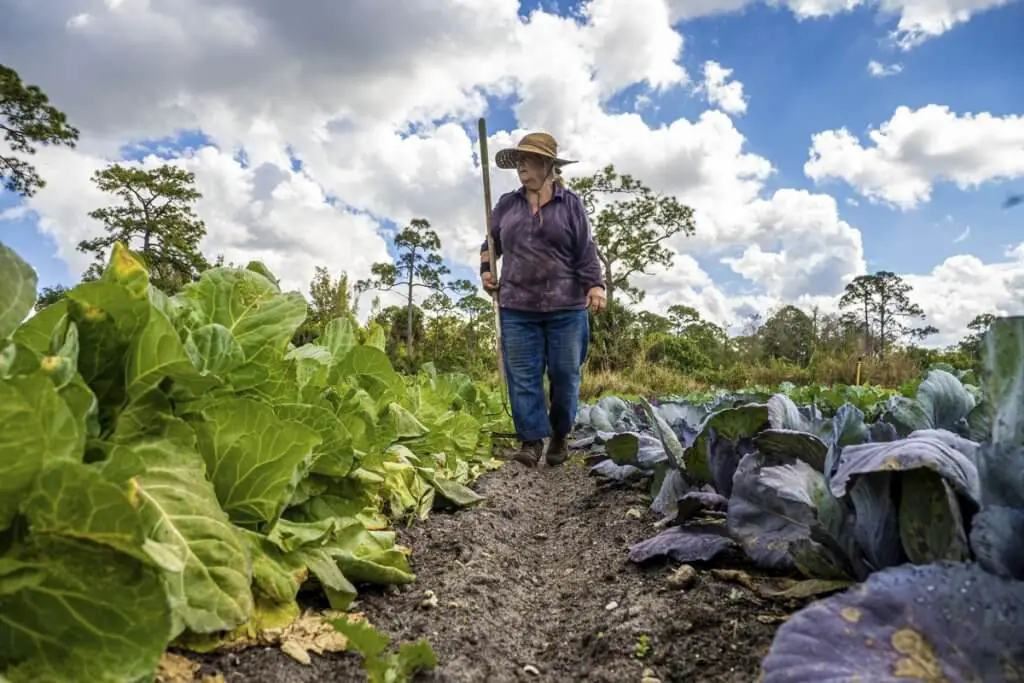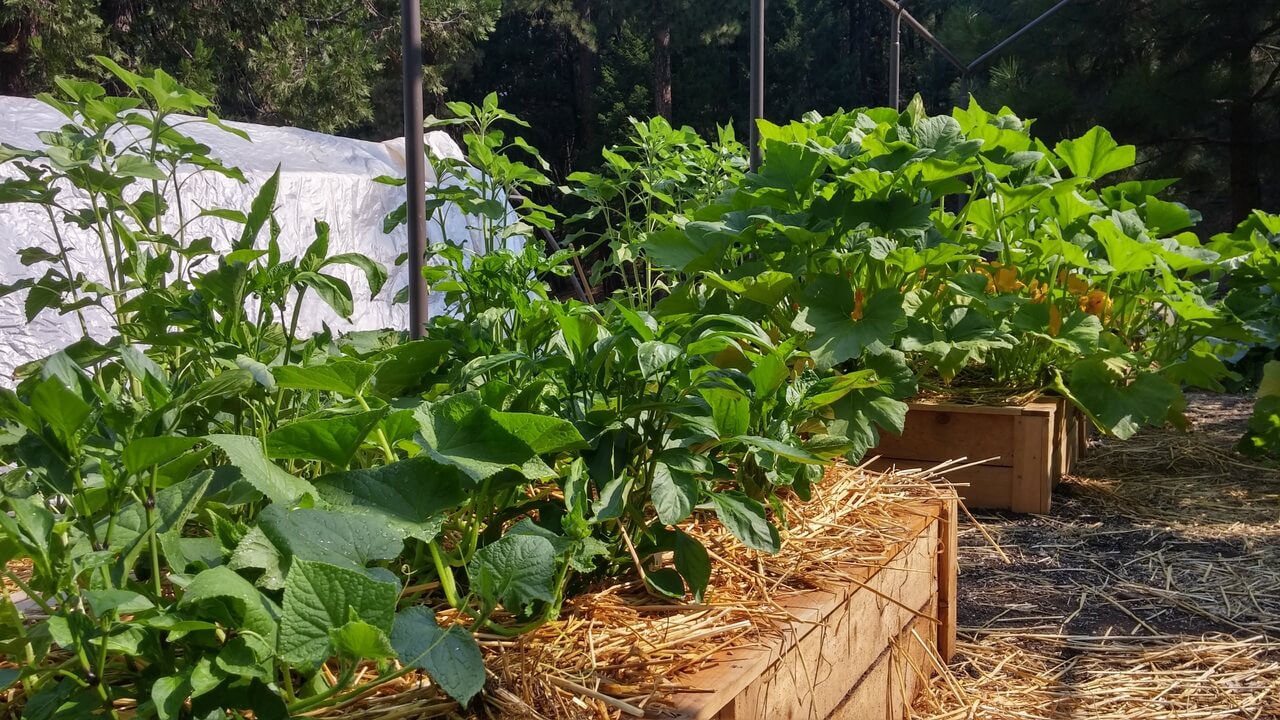Mature compost (humus) is one of the best options for your vegetable garden because it's made of organic material that provides plants with micronutrients. The best compost for your garden should be rich in organic matter like leaves, coffee grounds, eggshells, grass clippings, dried flowers, vegetable waste, and fruit scraps.
As an advocate of organic gardening, I’ve put together a comprehensive guide to help you choose the best compost for your vegetable garden.
Let’s get started…
Table of Contents
Should You Put Compost in Your Vegetable Garden?
Yes. You can put compost in your vegetable gardens as it helps improve soil drainage, aeration, and water retention. It also adds nutrients and organic matter to the soil, which promotes plant growth.
However, it’s important to note that too much compost can harm vegetables as it can lead to nitrogen toxicity and weed growth.
So, mix compost into the soil in a comfortable proportion for your garden and monitor the results over time.
What Kind of Compost Is Best for Vegetable Gardens?
Mature compost (humus) is one of the best options for your vegetable garden because it’s made of organic material that provides plants with micronutrients.
Mature compost is crumbly, black-gold in color, and has an earthy smell. Plus, it’s moist, neutral in PH, homogenous in texture, and well-draining.
When looking for the best compost for your garden soil, you’ll need to consider soil structure and the vegetables you’re growing.
For instance, alkaline soils are ideal for growing cucumbers, cauliflower, and kales, whereas acidic soils are better for pumpkins, tomatoes, and parsley.
So, where do you get compost?
You can make your own compost at home or buy it bagged at your local garden centers, mulch suppliers, or Amazon (check our Amazon recommendations below).
Let’s have a look at the two options:
Home-Made Compost: How to Make Compost
Composting at home is not only a fantastic way to create chemical-free fertilizer for your home garden, but it also helps reduce landfills and saves you money.
Even though composting might seem a bit tedious or might take longer to decompose, it’s worth the wait because you can use the compost for:
- Potting soil for garden seeds indoors
- Mulch to protect plants during hot seasons
- Control moisture loss in sandy soils
- Improve drainage in clay soils
Follow these simple steps to make your own compost:
- Step 1: Sort your garbage, and collect food scraps, shredded newspapers, wood chips, dry leaves, and other organic material.
- Step 2: Put the garbage into the compost bin.
- Step 3: Mix the compost ingredients with your hands or a shovel until it’s a uniform consistency.
- Step 4: Allow the compost to break down for a few days while stirring and misting water to prevent drying. Don’t overwater the pile as this will destroy beneficial microbes.
Extra Tip: You can add animal manure to your compost pile, but you should exercise caution to prevent the transfer of harmful bacteria.
4 Best Bagged Compost for Vegetable Gardens
Today’s market offers different types of compost; some of the best include:
#1. Fishnure Sustainable Sourced Odorless Organic Humus Compost
If you’re looking for highly concentrated compost, Fishnure Organic Compost has you covered. This natural fertilizer made of fish manure is an excellent source of phosphorus and nitrogen.
Fishnure compost is suitable for both indoor and outdoor plants. Not only does it promote root growth, but it also enriches important microorganisms in the soil.
Pros:
- Increases water retention and aeration
- Long-lasting due to high concentration
- Disease suppression
- It’s odorless
Cons:
- Contains humus
#2.Worm Castings Organic Fertilizer— Wiggle Worm Soil Builder
As the name suggests, Worm Casting Organic Fertilizer consists of earthworm castings. Worm castings are rich in large quantities of beneficial bacterias that help fight plant diseases and repel insects.
This all-purpose fertilizer promotes aeration because of the air spaces created when the castings mix with soil. It also improves soil structure and provides your vegetables with the necessary nutrients.
Pros:
- Made purely from natural worms
- Contains non-toxic ingredients
- The manufacturer provides a money-back guarantee
Cons:
- Not advertised as a compost fertilizer
#3. Blue Ribbon Organic Certified Organic Compost
Blue Ribbon Organic Compost is made from non-animal materials such as wood chips, vegetable waste, grass clippings, and other materials. This makes it suitable for organic potting soil because it improves soil structure, aeration, and water retention.
The Blue Ribbon Compost is certified organic, which meets the strictest biodynamics standards. It is also safe to use around pets and children.
Pros :
- It’s chemical-free
- Has higher diseases resistance
- Uses OMRI-certified ingredients
Cons:
- Quite expensive
#4. Dr. Earth All Purpose Compost
Dr. Earth All Purpose Compost is ideal for anyone looking to load their garden with nutrients that veggies will enjoy.
This organic compost consists of material rich in green-fed earthworms, which helps plants grow healthy. It’s also rich in alfalfa meal, a great source of nitrogen, potassium, phosphorus, and triacontanol (natural growth stimulant).
Pros:
- Best for both indoor and outdoor plants
- Improves soil texture
Cons:
- Traces of small rocks
Compost vs. Manure for Vegetable Gardens
The major difference between compost and manure lies in the ingredients. Compost comprises organic material such as shredded leaves, grass clippings, and food scraps, while manure consists of animal excrement.
The biggest benefit to composting is that it helps to recycle organic material. This process breaks down the organic matter and creates a fertile soil amendment to improve plants’ health and growth. Compost can also inhibit weed growth.
On the other hand, manure is an excellent option for improving water retention and supplying plant roots with nutrients.
However, after decomposing, you shouldn’t use it for vegetable gardens because immature manure can spread pathogens like E.coli and Salmonella.

Bagged Compost vs. Organic Compost for Vegetable Gardens
Generally, the best compost for vegetable gardens comes from your own compost pile. That’s because you’re sure to have the right mix (no synthetic material) of materials to create high-quality compost.
Organic compost is free of toxins and chemicals, making it safe for the environment. However, it’s best to wait until organic compost has completely broken down before using it.
At the same time, bagged compost can be a viable option if you can’t make organic compost at home. It contains some of the ingredients necessary for your plants that you might not have access to.
With bagged compost, you can determine the value of the macro-nutrients in the products—N-P-K ( nitrogen, phosphorous, and potassium) ratios. But it has disadvantages, such as:
- No guarantee that the ingredients used are organic
- Lack of microbe diversity
- Encourages wastage
- Expensive

